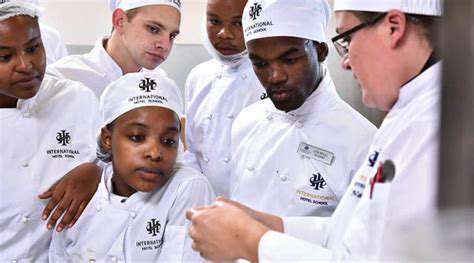A Guide to Culinary Schools for Travelers
Picking the right culinary school isn't just about the program - it's about the place. Being near food industry hotspots can make all the difference in your education. Imagine learning where top chefs work, with easy access to fresh markets and culinary events. This real-world exposure gives students priceless chances to network and gain hands-on experience. Plus, studying somewhere that matches your personality and career dreams keeps you motivated throughout the program.
Curriculum and Specializations: Tailoring to Your Aspirations
Not all cooking programs are created equal. You'll want to dig deep into course offerings to find one that matches your professional dreams. Some schools shine in particular areas like dessert making, bread baking, or plant-based cooking. Take time to explore these focus areas thoroughly - your future self will thank you for choosing a school that aligns perfectly with your culinary passions.
Faculty Expertise and Industry Connections: Learning from the Best
Great teachers make great chefs. Look for instructors who've actually worked in top kitchens and still maintain industry relationships. These connections can lead to incredible opportunities like internships or even job offers after graduation. When researching schools, pay special attention to faculty bios - their real-world experience will shape your education in ways textbooks never could.
Hands-on Training and Practical Experience: Mastering the Craft
Cooking is learned by doing. The best programs throw you into professional kitchens from day one, teaching everything from basic knife skills to advanced techniques. Seek out schools with modern equipment and a curriculum that emphasizes practice over theory. Bonus points if they offer strong internship programs - these real kitchen experiences are gold when starting your career.
Financial Considerations and Funding Options: Navigating the Costs
Let's talk money - culinary education isn't cheap. You'll need a clear picture of all costs, from tuition to supplies, plus any available financial help. Many students overlook scholarship opportunities or payment plans that could make their dream school affordable. Create a detailed budget and explore every possible funding source before making your final decision.
Accreditation and Reputation: Ensuring Quality Education
Not all diplomas carry equal weight. Always verify a school's accreditation status before enrolling. Talk to graduates, read reviews, and research how industry professionals view the program. A school's reputation can open doors (or close them) when you start job hunting, so choose one that culinary employers respect.
Student Support and Community: Fostering a Supportive Environment
Culinary school is challenging - you'll want backup. Look for programs offering strong support systems like career guidance and mentoring. A tight-knit student community makes the tough days easier and creates professional connections that last beyond graduation. Schools that prioritize student success often produce the most prepared graduates.
Choosing a Culinary School Based on Your Interests and Goals
Understanding Your Culinary Passions
Before browsing schools, grab a notebook and jot down what really excites you about cooking. Are you obsessed with perfecting French pastries? Dream of running a farm-to-table restaurant? Your culinary passions should drive your school choice. Think about your ideal learning environment too - do you thrive in high-energy settings or prefer more intimate classes? These personal preferences matter more than you might think when committing to a rigorous program.
Defining Your Career Goals
Where do you see yourself in five years? Running a bakery? Competing on cooking shows? Your long-term goals should directly influence which program you choose. Different schools prepare students for different career paths - make sure yours aligns with your professional aspirations. This clarity will help you evaluate programs more effectively.
Evaluating Program Curricula
Don't just skim course lists - really analyze them. Does the curriculum cover both classic techniques and modern trends? Are there electives that match your interests? Look beyond the marketing materials to understand what you'll actually be learning each semester. The right curriculum should excite you and address your skill gaps.
Assessing Hands-on Training Opportunities
The proof is in the pudding (literally). Top programs provide extensive kitchen time across various cooking styles. When visiting schools, pay close attention to their facilities - are they well-maintained with professional-grade equipment? Ask current students about how much actual cooking they do versus classroom time.
Considering Location and Accessibility
Where you study affects more than just your social life. Being near culinary job markets can lead to work opportunities during and after school. Think about transportation, cost of living, and whether the local food scene inspires you. These practical considerations often get overlooked in the excitement of choosing a program.
Analyzing Faculty Expertise and Experience
Great chefs aren't always great teachers. Research instructors' backgrounds - have they worked in restaurants you admire? Do they still maintain industry connections? The best culinary educators combine professional achievements with a passion for teaching. Their real-world insights will prove invaluable as you develop your skills.
Budgeting and Financial Aid
Create a detailed financial plan that includes all potential expenses - tuition, housing, supplies, and living costs. Many students discover too late that they underestimated the full cost of culinary school. Explore every possible funding source, from scholarships to work-study programs. Being financially prepared lets you focus on learning rather than worrying about bills.

The sinuses are air-filled cavities located in the skull that help reduce its weight and enhance voice resonance. They play important roles in respiratory health. Understanding sinus anatomy helps explain various types of head pain, including discomfort at the back of the skull.
Essential Considerations for Choosing the Right Culinary School
Location, Location, Location: Finding the Perfect Culinary Environment
Your school's location impacts your daily life and future opportunities. Are you drawn to the energy of food-centric cities or the focus of rural settings? Proximity to culinary businesses can provide invaluable networking chances. Also consider how the local culture and food traditions might influence your cooking style. Some locations offer unique culinary perspectives you won't find elsewhere.
Curriculum Design: Aligning Your Skills with Future Needs
A strong curriculum balances foundational skills with contemporary trends. Look for programs that evolve with the industry while maintaining classical techniques. Specialized tracks can be great if you have clear interests, but ensure you're also getting well-rounded training. The best curricula prepare students for today's kitchens while anticipating tomorrow's culinary innovations.
Faculty Expertise and Mentorship: Learning from the Best
Exceptional instructors make exceptional chefs. Seek out teachers who actively work in the industry while being committed educators. Good mentorship extends beyond the classroom - look for programs offering career guidance and professional development. These relationships often continue benefiting graduates throughout their careers.
Practical Experience and Internships: Gaining Real-World Exposure
Classroom learning only goes so far in the culinary world. Quality programs integrate substantial externships at respected establishments. These experiences not only build skills but often lead directly to job offers. Ask schools about their industry partnerships and graduate placement rates.
Accreditation and Reputation: Ensuring Quality and Credibility
Proper accreditation ensures your education meets industry standards. Research how employers view different programs - some schools carry more weight in professional kitchens. Talking to alumni can provide honest insights about a program's strengths and weaknesses.
Financial Considerations: Budgeting for Your Culinary Journey
Be realistic about costs and potential earnings after graduation. Some programs offer better return on investment than others. Explore all aid options early in your search process. Remember that the most expensive option isn't always the best fit for your goals.
Student Support Services: Creating a Conducive Learning Environment
Culinary school challenges students physically, mentally, and emotionally. Comprehensive support services can make the difference between struggling and thriving. Look for schools that prioritize student well-being alongside academic excellence.



![How to Travel on Points and Miles [Travel Hacking]](/static/images/27/2025-05/StayingUpdatedontheLatestTravelHackingTrendsandOpportunities.jpg)

![Top 10 Adventure Destinations in the World [2025]](/static/images/27/2025-05/ConqueringtheHimalayas3AMountaineeringandTrekkinginNepal.jpg)





